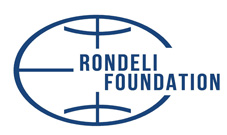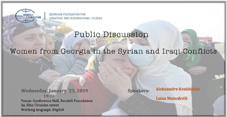
Public Discussion - Women from Georgia in the Syrian and Iraqi Conflicts
By Mariam Chanishvili
Wednesday, January 16
Public Discussion - Women from Georgia in the Syrian and Iraqi Conflicts - will take place on January 23 at 19:00 at Georgian Foundation for Strategic and International Studies? (GFSIS).
The working language throughout the discussion will be English with simultaneous Georgian translation.
Speakers include Aleksandre Kvakhadze, Research Fellow from Rondeli Foundation and Luisa Mutoshvili, Research Assistant, school teacher at Pankisi Gorge.
Since the beginning of Syrian conflict, the Caucasus region has witnessed an unprecedented exodus of the foreign fighters.
Academic papers or journalist reports regarding the male militants are present, but the issue of female jihadis has been neglected.
The identity and purpose of the women from Georgia, who have traveled to Syria, are vague and not precise.
Could their potential return lead to further radicalization? All these questions remain unanswered. The present research aims to shed light on the participation of Georgian women in Syrian and Iraqi conflict and assess their future following the collapse of IS.
Publication by Aleksandre Kvakhadze was supported by the Swedish International Development Cooperation Agency (Sida) and Rondeli Foundation.
Throughout the research process, the author visited the Pankisi Gorge and Azerbaijani-populated villages in Georgia with the aim of conducting interviews with family members of women foreign fighters from Georgia.
According to the research, 17 Georgian women were found in Syria or Iraq. The majority of them, 12 citizens, are ethnic Kists from the Pankisi Gorge. Additionally, four Azerbaijani women from the Kakheti (two from Karajala, Telavi Municipality, and one from Kabali, Lagodekhi Municipality) and Kvemo Kartli (Agtakla, Gardabani Municipality) regions and one ethnic Georgian woman converted to Islam. Women from Adjara or eco-migrant Adjarian communities have not been found. The average age of the women who moved to Syria is 26 years. The vast majority of them had secondary education and one had higher education.
Established in 1998, the Georgian Foundation for Strategic and International Studies (Rondeli Foundation) is an independent, non-profit policy think tank dedicated to helping improve public policy decision-making in Georgia through research and analysis, training of policymakers and policy analysts, and public education about the strategic issues, both domestic and international, facing Georgia and the Caucasus in the 21st century.
The activities of the Foundation are aimed at promoting democracy and fostering political and economic reforms; enhancing regional cooperation; creating a friendly and secure investment environment, and providing local private sector and the international business community opportunities to participate in the economy of the Caucasus region.


